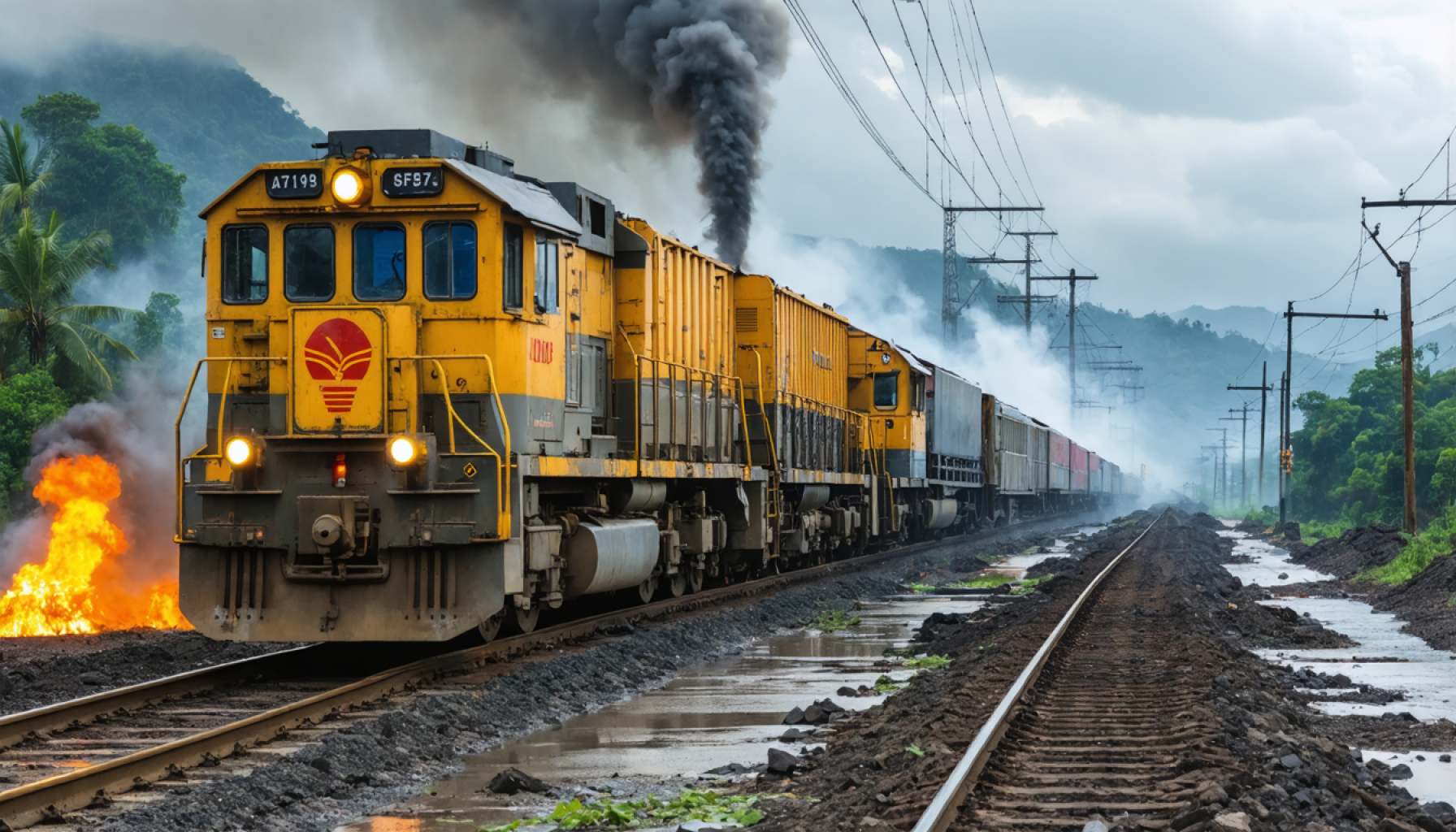- Indonesia, as the world’s leading nickel producer, aims to capitalize on its reserves to create a domestic EV battery supply chain.
- The global shift toward cobalt-free and alternative battery technologies poses a challenge to Indonesia’s nickel-centric strategy.
- China’s economic slowdown impacts the global EV battery market, influencing nickel demand and Indonesia’s growth prospects.
- Indonesia has made significant investments in nickel processing facilities and international partnerships to boost green technology.
- Adapting to evolving market preferences and fostering domestic resilience are crucial for Indonesia’s future economic success.
- Innovation and strategic diversification will be essential for Indonesia to leverage its resource richness into enduring prosperity.
A tropical breeze rustles through the palm-fringed landscapes of Bali, Indonesia, where the economy dances to a mineral beat. Nickel, glittering like a modern gold, stands at the heart of Indonesia’s industrial ambitions. As the world’s leading producer of this pivotal metal, Indonesia dreams of transforming its vast reserves into the foundations of a domestic electric vehicle (EV) battery supply chain, powering the green machines of tomorrow. However, the winds of global demand are shifting, and Indonesia must adapt swiftly to avoid a stalled future.
At the crux of this challenge lies a surprising dynamic—the evolving preferences of the EV sector. Battery technologies are morphing, with manufacturers eyeing cobalt-free options, lighter lithium, and even sodium alternatives. This shift comes against the backdrop of China, which holds the status of both a critical player in battery production and a vast market for EVs, facing economic stagnation. The repercussions are palpable. The anticipated decline in nickel demand threatens to shake the very foundations of Indonesia’s ambitions.
Here, the economic pulse beats to a rich harmony of lush resourcefulness and forward-looking innovation. Indonesia has invested heavily in its narrative as a linchpin of green technology, setting up smelting hubs and forging international partnerships to capitalize on the nickel rush. Yet, the juxtaposition of innovation and underwhelming demand growth casts a shadow over the nation’s horizon of future prosperity.
A vivid picture unfolds as global carmakers pivot away from nickel-heavy chemistries, not least because of cost and sustainability concerns. Sophisticated new methods in battery construction promise not only to revolutionize energy storage but to usher in an era where nickel plays a lesser role. This new economic reality is not lost on Indonesia, whose response will be crucial. Turning uncertainty into opportunity isn’t just about refining steel; it requires forging ideas and strategies that outshine traditional pathways.
The unfolding scenario’s moral is clear—adapting swiftly to global trends while fostering domestic resilience will define success. Indonesia’s ability to convert its rich nickel reserves into a diverse portfolio of future-proof industries will be pivotal. In the face of waning demand, it is not individual minerals that shine, but the human ingenuity and adaptability that can illuminate a pathway to sustained economic luminosity. As eco-conscious technology strides forward, Indonesia must channel its rich heritage of resourcefulness into resilient, innovative responses that meet tomorrow’s needs today, propelling its economy toward a resilient future gleaming with opportunity.
Unlocking Indonesia’s Nickel Potential: Key Trends and Strategic Moves
Understanding the Shift in EV Manufacturing
Indonesia’s plan to become a global leader in nickel-based industries, especially for electric vehicle (EV) battery production, is facing new challenges. With carmakers increasingly adopting cobalt-free, lithium, and sodium alternatives, the demand for nickel is under threat. This shift could substantially impact Indonesia’s economic strategy, given its reliance on nickel exports.
Emerging Battery Technologies
1. Cobalt-Free Batteries: Automakers are exploring these due to cobalt’s high cost and ethical sourcing concerns. As a result, manufacturers are leaning towards alternatives with a reduced nickel composition.
2. Sodium-Ion Batteries: They offer the potential for lower costs and higher sustainability. Although still in development, sodium-ion batteries could significantly impact the market if they reach commercial viability.
3. Solid-State Batteries: Known for better safety and energy density, these batteries could revolutionize energy storage, posing another challenge for nickel-heavy cathodes.
Indonesia’s Investment in Nickel
Indonesia’s strategy has included substantial investments in smelting and refining technologies and fostering international partnerships with countries like China and South Korea. However, with changing international demand, Indonesia must realign its focus to keep pace.
How Indonesia Can Adapt
– Diversification: Broadening the scope beyond just nickel will be crucial. Indonesia could look into expanding its presence in other sectors like renewable energy parts or mineral processing.
– Innovation and Research: Investing in R&D to develop alternative battery solutions that align with global trends could turn Indonesia into an innovation hub.
– Policy and Regulatory Frameworks: Strengthening policies that support new industries and promote sustainable practices will be vital for future resilience.
Market Forecasts and Industry Trends
– Declining Nickel Demand: If the trend towards alternatives continues, demand for nickel may decrease, impacting prices and potentially leading to oversupply.
– Increased Demand for Alternative Materials: Materials like lithium iron phosphate (LFP) are gaining traction for their cost-effectiveness and longer life spans.
Potential Threats and Opportunities
Controversies & Limitations
– Environmental Concerns: Nickel mining can have substantial environmental impacts, which may not align with global green initiatives.
– Economic Dependency: High reliance on nickel could lead to economic vulnerability. Strategic diversification is essential to mitigate this risk.
Actionable Recommendations
1. Invest in Education and Training: Empower the workforce with skills needed for emerging industries, ensuring talent is available as new opportunities arise.
2. Embrace Technological Solutions: Leverage technology for more efficient mining practices to reduce costs and environmental impact.
3. Foster Global Partnerships: Engage with global leaders in battery technology to stay abreast of the latest developments and collaborate on cutting-edge projects.
In conclusion, as the world transitions towards a sustainable future, Indonesia’s ability to adapt and innovate will be crucial in securing its economic prosperity. The country must leverage its resources wisely while investing in new technologies and industries to pivot successfully to this new era.
For more information on Indonesia’s broader economic goals and developments, visit Indonesia Investments.
